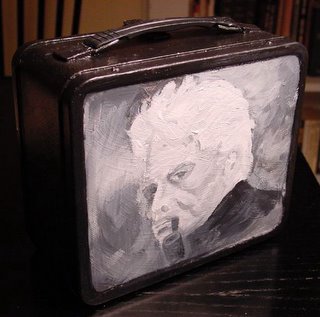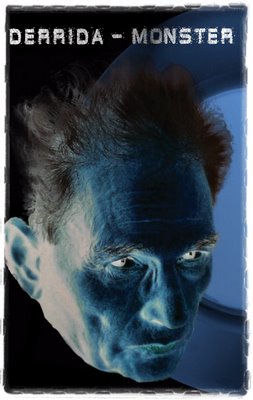
As I mentioned before I picked up a real gem of a book for a mere 36 cents called God and the Philosophers: The reconciliation of faith and reason. It is a book comprised of short autobiographical essays produced by philosophers on the subject of faith and reason. I read the short article by Merold Westphal entitled Faith Seeking Understanding, and I sum it up as follows:
On the Christianity of his Youth:
Westphal grew up in the type of circles that had a bumper sticker sort of hermeneutic 'God Said It, I Believe It, That Settles It,' the function of this sort of hermeneutical theory, as Westphal explains, is to terminate conversation and critical reflection. He goes on to state that, by terminating conversation with those who do not share one's specific interpretation of the faith, one pretty much terminates the possibility of critical reflection on the truth, meaning, and relative significance of the various components of one's theology, rendering one's current understanding of the faith final for all intents and purposes. Ironically, the quest for certainty that motivates this posture is anything but philosophically innocent. It is more like a cross between Plato and Descartes dressed up in its Sunday's best.
On Suspicion and Faith
Thus I have found it necessary to take seriously such theories, often motivated by unbelief and just as often perceived as threats to the life of faith, as Nietzsche's perspectivism, Heidegger's hermeneutical circle, and Derrida's deconstruction based on differance. If there is ultimately a theological rationale for my serious exploration of these powerful secular forms of finitism, it is a willingness to be put in question. However imperfect the practice is of this willingness, it is an essential ingredient of faith as a virtue.
Faith's self-understanding is likely to be changed in the process. My own faith has continued to be central to my being-in-the-worlds but it has not been a fixed and final point impervious to reinterpretation. Faith in the unchangeableness of God does not entail the unchangeableness of faith itself, for faith is not so much my holding on to God as it is my willingness to let God hold on to me. Such faith includes the trust that in this process one's relation to God will be deepened rather than destroyed, and that has been my experience. I don't have the world on a string (or God in a box), as I did when I first came to philosophy. But I am convinced that I understand both God and myself better because of these losses. What Jesus said about finding our life through losing it has many meanings' one of which, in my experience, pertains to the life of the believer engaging in philosophical reflection. We have a similar experience when we discover that human relations, such as marriages are so much richer when we abandon the effort always to be in control.
On Kierkegaard and Sin:
Kierkegaard does not deny the finitude that is the heart of the Kantian analysis; but he subordinates it to a more radical rift between ourselves and God, our sinfulness, which he understands as our point of being useful without being a nuisance, He points out the workings of this desire, not just in our behavings but in our believings as well. Hence the contrast between 'humanly understood' and 'divinely understood.' What made me 'vulnerable' to these experiences was in large part the constant reminder from Kierkegaard that the thinking of sincere Christians was not immune to the corruptions of the fall. I was no longer able simply to identify the Christian world view I had inherited with the truth of God. Once Kierkegaard had become the occasion for a shaking of the foundations'significant parts of that edifice came tumbling down like the walls of Jericho. I was learning that the life of belief is a journey, and that 'living happily ever after,' poetically speaking, comes at the end of the story and not in the middle.
On the Lenten Reflection of the Secular:
Derrida, Marx, and Freud proved to be my worst friends' the kind everyone needs--to tell you what you best friends won't tell you, about your bad breath and dandruff. I found them to echo in the context of modernity the kind of critique originally directed by Jesus, the prophets who preceded him, and the apostles who succeeded him to those who saw themselves as the covenant people of God. These great modern atheists helped me to discover a dimension of the biblical message I had not noticed much before. A sustained appeal to the Christian church to take all religion critiques of this unholy trio seriously rather than simply trying to debate or discredit them, to read them as a kind of Lenten spiritual exercise in self-examination. It seems to me that their deeply hostile and unflattering accounts of the personal and corporate life of Christians is all too true all too much of the time. I don't think it is the whole truth, as they are inclined to suggest, but the best way to show this, I think, is not to argue against their theories but to submit to their discipline and relearn to live the life of faith in ways less vulnerable to their critiques. If there is more to the life of faith than self-deception in the service of self-interest, the best demonstration of this is not proof but practice. Here piety is useless in the sense of not having its value as a means to some end; and it is self-transcendence, not because it relates to the Transcendent (which can be an entirely ego-centered project), but because it involves a decentering of the self that always aspires to be the center of the world.
On Useless Self-Transcendence:
The concept of useless self-transcendence is not an argument for the rationality of religious belief. But it is a challenge to every rationality, sacred or secular, that functions to make the human self or the human community the possessor and dispenser of Truth. At the same time it summarizes, perhaps better than anything else--what my faith has found as it has sought understanding, namely, that faith is the task of a lifetime. The present narrative ends hereby but the story it has tried to tell goes on. As those who know me best will gladly attest, God isn't finished with me yet.









